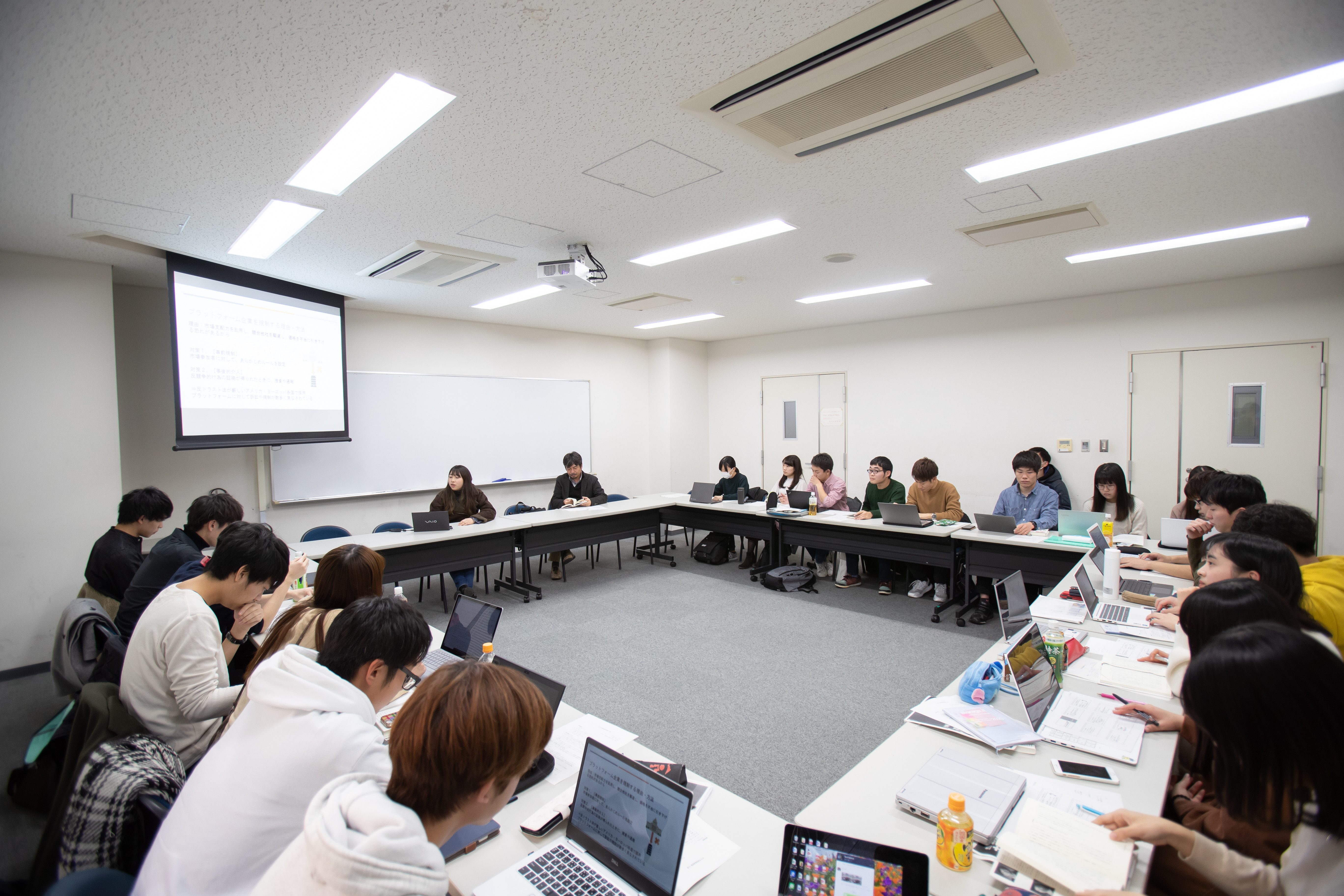Faculty of ECONOMICS
Promoting flexible thinking and greater creativity to pave the way for the future
Develop judgment to overcome difficulties

The Faculty of Economics at Kyoto University enables students to identify problems and find solutions for themselves in line with the fundamental learning principle of "self-study." This is based on the idea of "academic freedom," allowing us to pursue diverse methods of thinking and respond reasonably to the demands of a developing society along with scientific development. It is essential to build a foundation with which to exercise academic freedom under a spirit of self-study. Based on this belief, the economics and management studies offered at Kyoto University focus on developing the ability to make effective judgments, regardless of social position.
Four fields across the areas of economics and management studies
The Faculty of Economics at Kyoto University emphasizes the connection between economics and management studies and has combined them into one program. The Program majoring in Economics and Management offers four groups of fields: A) Microeconomics and Macroeconomics, B) Institutional and Historical Studies, C) Management and Accounting, and D) Mathematics, Statistics, and Information. Students are able to develop their expertise by taking courses from chosen fields.
Building the foundation for specialization in the first year
In the first two years, students mainly take Liberal Arts and Sciences Courses including language courses. To acquire core academic skills in the first year, they participate in "introductory seminars" and take several of nine "introductory courses": Introduction to Microeconomics, Introduction to Macroeconomics, Introduction to Political Economy, Introduction to Economic History & History of Social Thought, Contemporary Economic Affairs, Introduction to Management, Introduction to Accounting, Statistics 1, and Introduction to Information Processing. (See the overview below.)
Building expertise in the second year and after
In accordance with their goals for the future, students take specialized introductory courses, specialized courses, and special lectures in economics and management. Furthermore, from the third year onward, students can participate in a seminar each year in which the instructor involved provides guidance on a specific theme.
Overview of Studies
Nine introductory courses
Building the foundation of both economics and management studies for interdisciplinary learning
The Faculty of Economics at Kyoto University offers the undergraduate program majoring in economics and management. Students are thus able to transcend the boundaries of these closely related fields by studying them in conjunction. In this system, students must develop a solid foundation of both economics and management studies by taking introductory courses in their first and second years. An overview of the courses is as follows:
<Introduction to Microeconomics>
Microeconomics is the analysis of how economics functions based on the market mechanism. It adopts a perfect competition model that stems from the maximization principle popularized in the 19th and 20th centuries. Today, however, the economy tends to be dominated by mega corporations, making evident the fictitiousness in perfect competition models. These factors have resulted in the emergence of the game theory, wherein strategic decisions are made by playing a game, such as Shogi, Japanese chess. With a focus on this game theory, modern microeconomics has become a fundamental tool for cutting-edge applied economics, including healthcare and welfare economics, marketing economics, economics of information and communication, urban and transportation economics, business and organizational economics, and environmental economics.
<Introduction to Macroeconomics>
Macroeconomics is the economics area that analyzes economic activities from a wider perspective. In other words, macroeconomics is not used to analyze economic activities of a specific individual, company, or industry; rather, it provides a comprehensive vision of national and world economies. This causes the following questions to arise: Why does the economy experience booms and busts? What measures should the government take to control economic changes? How did developed countries successfully transform their industrial structure and increase their income? Why do developing countries fail to change their agriculture-dependent economic structure and continue to have a low-income status? Macroeconomics provides the information to accurately respond to such questions.

Social economics was previously used as a generic term for the theories of classical economists, such as Adam Smith, David Ricardo, and Karl Marx. They had a wide social perspective that was not limited to economics, but which extended to politics and culture. Their long-term vision enabled the examination of centuries of history. However, in the early 20th century, classical economic theories began losing their validity due to changes in technology and organizational structure; mass-production technology was established and gigantic corporations emerged. With these changes in capitalism, John Maynard Keynes and Michał Kalecki created new theories. Modern social economics helps analyze the structure and system of modern capitalism, combining the social and historical viewpoints from classical economists with Keynes' and Kalecki's theories.
<Introduction to Economic History & History of Social Thought>
Economic History & History of Social Thought is based on the notion of "温故知新 (Onkochishin)," which refers to the development of new ideas based on studying the past. Students will examine current economic society from a historical perspective, rediscover the "forgotten issues" of economics and society, and generate "new issues" with a view toward "how economics should be." For example, students discover the secrets, conditions, and issues of the country with the largest economy by analyzing the process of their creation; consider the role of management by examining the growth and collapse of a company; or understand various issues experienced when forming a group. In this way, they can develop a viewpoint that facilitates the discovery of new possibilities in aspects of everyday life usually taken for granted.
<Contemporary Economic Affairs>
In the study of human society, economics is used to address economic and social issues; this concept is also referred to as "interest in policy." The topics of Economic Policy, Finance, Financial Theory, Social Policy, World Economics, and Public Economics included in this subject are common to the approach of "study based on current social and economic issues." Although there are many approaches to address economic issues, understanding complex social phenomena requires a holistic and multifaceted analytical perspective. The shared objective across the lessons in this subject is to develop sensitivity and a multifaceted view toward actual economic issues.
<Introduction to Management>
Management studies broadly examine business phenomena. Management implies planning, directing, and running business activities to achieve a specific goal. The concept of management was previously limited to private companies; however, it has extended to other social entities where management quality is important, such as hospitals, government, local authorities, and NPOs. In addition, businesses are being required to not only pursue profits for themselves, but also benefit individuals referred to as stakeholders, creating a more complicated management system. This also makes theories of management studies that address optimal solutions more complex. Taking on these challenging issues of theory and practice is the essence of management.
<Introduction to Accounting>
Accounting, or the "language of business," provides an accurate understanding of the status of entities and allows for the consideration of the best accounting status. Accounting is broadly classified into two categories: macro accounting (including social accounting and national accounts) and micro accounting (including household accounting, corporate accounting, non-profit organization accounting, and public accounting). In addition, based on the users, it can be further split into an additional two categories: financial accounting (intended for shareholders, outside enterprises, and creditors) and management accounting (intended for business managers). Thus, two academic fields, financial accounting studies and management accounting studies, have been developed for its examination.

Statistics was previously used to provide the necessary materials for public administration and to collect figures for the organization of populations, incomes, and cultivated land to measure national power. Currently, however, it covers a wide range of data and is applied to multiple fields, including public administration and commerce, as well as being a criterion for investments in stocks and currencies. Thus, in this class, students mainly learn about two areas: descriptive statistics and mathematical statistics. In descriptive statistics, students learn about tools, such as the price index, that are primarily used in professional practice. In mathematical statistics, they learn to verify various estimations and hypotheses from a mathematical viewpoint.
<Introduction to Information Processing>
Information processing is a social activity that refers to the decision-making process of human beings, requiring the support of information communication technologies, such as the Internet and computers. In addition, the rapid development of technology has drastically changed society; businesses not using them (or without familiarity with them) would fail. However, this information processing class is not limited to the study of economics and management. Students learn about information processing technologies, including communication, while analyzing society and organizations using computer simulations, forecasting the future, and examining the foundation of economics and management studies.








